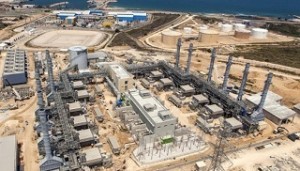By Sami Zaptia.

Tunis, 28 September 2016:
The General Electricity Company of Libya (GECOL) has reported that Khoms power station is expected to go into operation in the coming days. It is reported that the power station has just had an expansion programme completed by a Turkish company.
If Khoms does come online, it has a generation capacity of 550 MW. GECOL says that it has a power generation deficit of about 1,600 Mega Watts. This deficit has forced GECOL to enforce regional power cuts. GECOL has admitted that the five-month late payment of salaries to GECOL employees was also contributing to the power cuts. GECOL has since announced that salaries are expected to be paid in a months’ time.
The Khoms news comes on the back of a report by GECOL last week that the fifth unit at the South Tripoli power station with 90 MW capacity had also come online.
Both reports followed an earlier announcement by GECOL earlier that the second unit at Ruwais, capacity 130 MW each, had also become operational.
The combination of the operation of these power stations is unlikely to put a complete end to the hated power cuts, but nevertheless will come as welcomed news to the beleaguered Libyan public and the Serraj Presidency Council/Government of National Accord (PC/GNA).
It will be recalled that three weeks ago GECOL had revealed that it had reached an agreement with the Mayors of the Greater Tripoli Municipalities that organized power cuts would be limited to a maximum of six hours and would now be enforced equally on all areas of the capital.
The announcement followed road closures and the burning of tyres by youth across the capital since in anger and protest at the very long hours of power cuts forced in the city.
Sug il Juma youth had closed off the road leading to Mitiga airport after what they said were regular 12-hour power cuts. There were numerous other road closures, including Tripoli’s main east-west motorway. Salah-al-Deen and Zanata had also reported 12-hours of power cuts and Zawiet al-Dahmani and Tajura, for example, had reported 9 hours of power cuts.
The Faiez Serraj Presidency Council/Government of National Accord (PC/GNA) was also reported to have held a meeting with a number of Municipality leaders of Greater Tripoli as well as adjoining towns and cities to discuss the issue of power cuts.
GECOL had revealed that there is a proposal that Tripoli would get its own power station at Bir Sta Milad.
It will be recalled that GECOL employees had taken part in a number of demonstrations in August due to the late payment of their salaries. During a one-day strike in Tripoli last month, they had threatened to go on an indefinite strike, saying they had not been paid since March.
GECOL had also reported that it was unable to obtain foreign currency Letters of Credit from the Central Bank of Libya in order to import needed spare parts and that very few Libyans were bothering to pay their electricity bills – which was adding to the poor financial state of GECOL.
In July this year, the Faiez Serraj-led Presidency Council/Government of National Accord had fired the entire GECOL board on the grounds that it had failed to stop the power cuts. Today, residents of some parts of Tripoli reported a decrease in power cuts.
Meanwhile, in the latest move by the Libyan National Army to take control of all levers of power in eastern Libya, Major-General Abdul-Razzaq Al-Nazhouri, last week, dismissed officials in charge of state electricity company GECOL in the east of country and replaced them with a seven-man committee answerable to himself.
Nazhouri, appointed military governor of the area from Tobruk to Ben Jawad (in effect all of Cyrenaica) by House of Representatives president Ageela Saleh, has now ordered the new committee to solve the power shortages in the east and other issues such as the delays in salary payments for company staff.






